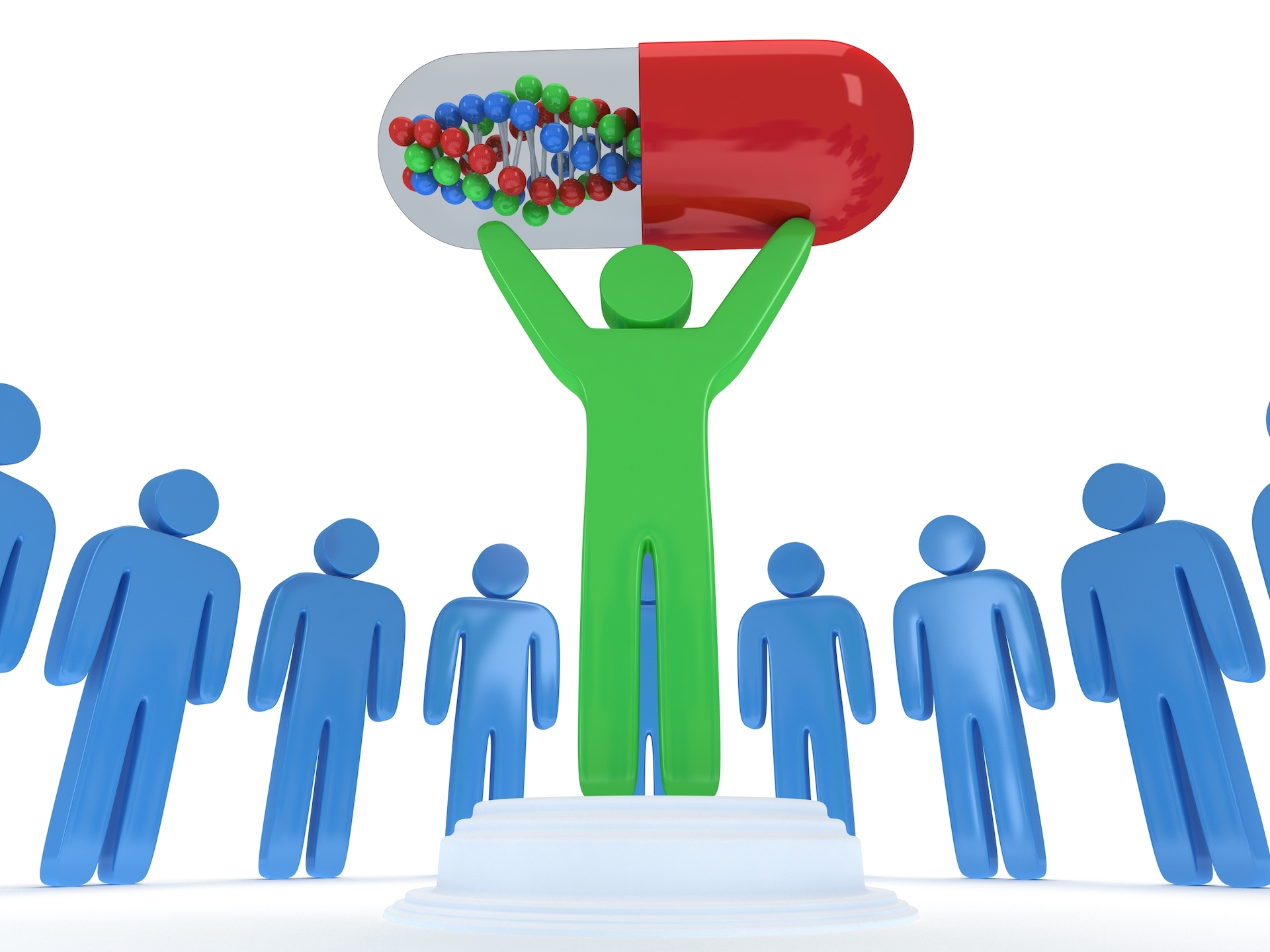The medical science and healthcare systems are evolving daily, thanks to the staggering progress in technology and research. One breakthrough of these innovative efforts is the inception of ‘’personalised medicine’’, also called the ‘’precision medicine’’ intervention. It is a radical approach to refine the traditional diagnostic and treatment methods in order to provide precise, more effective treatment to the patients with minimum risk and cost. Although initially perceived as improbable, personalised medicine is becoming more feasible with our improved understanding of genetic science and the advances in related technology.
The motivation
The origin of the personalised medicine era can be traced back to the unfolding of the human genome sequence in 2003. Access to the complete human genome sequence and the advances in genomics, proteomics, bioinformatics, and data-intensive biomedical assays have enhanced our understanding of inter-individual variations profoundly. All this progress led to the thought of individualised therapy wherein the treatment can be tailored to an individual based on his/her genetic, environmental exposure, and behavioural profile. In a nutshell, personalised medicine aims to provide the right medicine to the right patients at the right time.
The applications of personalised medicines are far-reaching, affecting the present healthcare system and treatment drastically. The biggest advantage of personalised medicine is that not only it makes the treatment more specific and effective, but more than that, it has the potential to predict and detect the earlier onset of diseases through its powerful diagnostic biomarker tools. This can help in alarming the physicians in advance so that they can start with the preventive treatment well before the disease progression. Besides, the following benefits reveal how personalised medicines can revolutionise the traditional healthcare and treatment approach.
- Highly targeted therapy with improved medicine selection
- Reduced incidences of adverse effects
- Reduced patient discomfort encouraging them to adhere to the treatment
- Focus on proactive treatment instead of reactive ‘’trial-and-error’’ approach
- Reduced cost of the overall treatment
- An opportunity for pharma companies to develop molecular-targeted therapeutics through the optimum use and repurposing of the existing and combination therapies
The applications of personalised medicines are more likely to impact therapeutic areas such as oncology, cardiovascular diseases, neurodegenerative disease, psychiatric disorders, and metabolic disorders like obesity and diabetes. According to researchers, personalised medicine can accelerate the new drug development program reducing the cost of the overall process. With the help of pharmacogenomic data on a new molecule and corresponding information about how a patient’s gene affects drug responsiveness, the scientists can identify a subset of patients who are most likely to respond to the treatment or least likely to have adverse effects in clinical trials. It means there would be a smaller number of patients required to complete the clinical trials, which would reduce the time and cost associated with such studies dramatically.
The obstacles
Although personalised medicines can shift the tide of the conventional diagnostic and treatment approach, their implementation is still limited and is far from commercial use. To exploit the benefits of personalised medicines, the following challenges must be addressed:
- Lack of awareness – The full potential of personalised medicines and their applications is not yet realised by the current healthcare system, physicians, and patients, and that is the biggest hurdle limiting its widespread use. A great deal of efforts is required by all the stakeholders, including entrepreneurs and innovators (development of intelligent tools and analysis of the genetic information), patients (participation in clinical trials), regulators (educate consumers and support policy and regulations), physicians (deep understanding of the disease at the molecular level), academic researchers (gain new insights at the molecular basis of disease to support target-based drug development), IT segment (create a secure data management system to collect patient information).
- Limited research – Although we have uncovered the human genome sequence and the tools to expedite the process, there is still a need for a more mechanistic understanding of the genetic markers and certain diseases to develop more specific diagnostic tests.
- Commercialisation – The innovators and manufacturers are still struggling to identify cost-effective technology and operational systems with additional tools required to commercialise personalised medicines.
- High cost – Currently, the treatment with personalised medicines is highly expensive as it requires sophisticated techniques and tools along with expertise. This is another barrier that is keeping the patients from using it on a large scale.
- Data protection – A highly organised and secure system is required to keep the personal information and electronic health records (EHRs) of the individual patients confidential during the investigation and developmental stages. This also calls for establishing appropriate healthcare policies and regulations to make sure that the genetic information and EHRs of patients are not used for any nefarious purpose.
The progress
Despite many challenges, pharma companies have started implementing the precision medicine approach to design highly targeted therapeutic drugs. Here are few examples worth mention.
- HER-2 gene – Considered as the ‘’poster child’’ of personalised medicines, the HER-2 gene is responsible for a protein that causes a type of breast cancer. Women who test positive for this gene are likely to respond well to the treatment with Herceptin – a drug for breast cancer.
- Warfarin – Anticoagulant drug, warfarin, is a highly potent medication and must be dosed accurately, for even a slight change in the dose can lead to life-threatening adverse drug reactions. Warfarin acts on a specific gene, VKORC1, and is metabolised by the enzyme CYP2C9. Any genetic variations in the genes responsible for VKORC1 and CYP2C9 proteins can therefore alter the metabolism of warfarin, leading to excessively high or low plasma drug levels. To avoid such fluctuations, USFDA recommends the dosing of warfarin based on the individual’s genotype of VKORC1 and CYP2C9 proteins.
- Imatinib – This drug is used for the treatment of chronic myelogenous leukemia (CML). Imatinib inhibits the enzyme tyrosine kinase. High levels of this enzyme are found in a particular genotype of people suffering from CML wherein the tumors show a specific type of mutation that involves the fusion of two genomic regions, also referred to as ‘bcr-abl fusion’ or ‘Philadelphia chromosome’. Hence, only those CML patients who show this fusion-specific gene mutation are treated by imatinib and is more effective.
- Bacteriophage therapy – Bacteriophage are viruses that invade and kill bacterial cells. Scientists are currently investigating the use of bacteriophage therapy as a novel antimicrobial approach to treat antibiotic–resistant bacterial infections. One method to make this therapy more effective is to use a personalised cocktail of bacteriophage that is unique to the patient’s bacterial strain. This way, one can overcome the resistance of bacterial strains to the traditional antibiotics.
Takeaway
There is no doubt that personalised medicine is just the beginning of the healthcare system that will be practiced in the future. Although the research in this area needs to cover several things, the results of the pioneering work have shown us enormous benefits, which include faster drug discovery programs, reduced development cost, improved diagnostics, and above all, more specific, safe, and effective treatment for patients. What needs more at this stage is awareness and education amongst all the stakeholders and regulatory support from the FDA as well as policymakers.
References
-
https://www.pharmaceuticalonline.com/doc/the-potential-of-personalized-medicine-0001
-
Goetz LH, Schork NJ. Personalized medicine: motivation, challenges, and progress. Fertil Steril. 2018;109(6):952-963.
-
Mathur S, Sutton J. Personalized medicine could transform healthcare. Biomed Rep. 2017;7(1):3-5.
-
2021 Advancing Regulatory Science at FDA: FOCUS AREAS OF REGULATORY SCIENCE (FARS).



